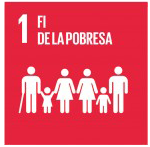Climate crisis affects pregnancy and childrearing in the city of Barcelona
A study by the UAB conducted by anthropologists from the UAB's AFIN group thanks to funding from the Barcelona City Council was presented on Thursday 20 November in Barcelona. In the study, researchers alert that pollution, heat waves and precarious living conditions directly affect pregnant women and families with children living in the city of Barcelona. Over 80% of mothers wish they could live in a healthier environment, but 40% cannot leave the city for economic reasons.

The research demands urgent measures be taken to protect the health of mothers and children under the current climate crisis.
The results of the research project "Viure l’embaràs a Barcelona: dones i persones gestants davant l’emergència climàtica" were presented on 20 November. The project was conducted by the AFIN group of the Department of Social and Cultural Anthropology at the UAB, with lecturer Diana Marre as principal investigator, and funded by the Barcelona City Council. Researchers worked in collaboration with the Hospital Sant Pau, the Hospital Sant Joan de Déu, and the Hospital del Mar.
The presentation took place at the Centre d’Innovació Urbana Ca l’Alier in Barcelona during the conference "Daughters of the Climate Emergency: Rebuilding Futures, Rethinking Motherhood, Inhabiting Barcelona", which brought together experts in health, architecture, urban planning, anthropology, and public policy. The results of the project are published here.
The study, carried out by AFIN researchers Carolina Remorini, Ana Cerezuela González and Helena Montasell i Punsola, combined 35 in-depth interviews with 313 surveys of pregnant women or new mothers living in the city's 10 districts. It was carried out with the aim of understanding how environmental and urban changes influence reproductive decisions, health and the daily lives of families.
According to the data collected, more than 80% of the mothers surveyed would like to live in a healthier environment. While 15.3% of the participants have already moved outside Barcelona in search of a healthier environment, 40.6% would like to do so but cannot afford the financial cost. A total of 96.5% consider it essential to avoid stress resulting from inadequate home conditions (extreme heat, lack of insulation, power cuts, etc.), and 64.8% perceive a lack of adequate public spaces (shade, fountains, places to breastfeed, etc.).
Participants point to constant noise, air pollution, high temperatures, the difficulty of enduring hot nights and the lack of shaded spaces or water as the main obstacles to safe and healthy parenting. The interviewees consider the city to be “not friendly” for children.
Participants also express concern about endocrine disruptors and highlight the lack of clear information about environmental risks during pregnancy.
The project confirms that many women experience motherhood in a context full of eco-anxiety, with fear for the future health of their children and a growing feeling that the responsibility falls excessively on mothers, without proportional institutional support.
The study points out that today Barcelona is not a city that respects children or care and that social and economic inequalities deeply condition the possibility of protecting maternal and child health in the face of the climate emergency.
Effects of climate change and urban precariousness
Participants describe difficulties in maintaining an adequate temperature at home, with poorly insulated homes and high air conditioning costs. The lack of green areas, shaded spaces and public fountains exacerbates the effects of heat waves, while noise and air pollution contribute to daily stress and discomfort.
Researchers point out that women deploy multiple protection strategies, such as adapting routines, not going out during the hottest hours, using less toxic products, or encouraging sustainable habits in their children. However, adaptation options depend greatly on economic level and housing conditions, which makes the environmental inequality that exists in the city evident. Families with lower incomes find it more difficult to have comfortable homes, to air-condition spaces, or to temporarily flee the city during the hottest months.
Demand for public policies on environmental and reproductive justice
The study highlights that motherhood in times of climate crisis is often associated with guilt, anxiety and ethical dilemmas in the face of an uncertain environmental future. The researchers call for public environmental and childhood health policies that address the problem in a collective and structural way, and that do not delegate all responsibility to families, especially women.
“Taking care of maternal and child health in a context of environmental crisis cannot be an individual or domestic task”, says researcher Carolina Remorini, anthropologist coordinating the research project. “A collective commitment is needed to guarantee healthy, sustainable and equitable urban environments for all mothers and children,” she concludes.
The UAB, with Sustainable Development Goals
Decent work and economic growth
Good health and well-being
Reduced inequalities
Peace, justice and strong institutions
Gender equality
 No poverty
No povertySustainable cities and communities
Climate action